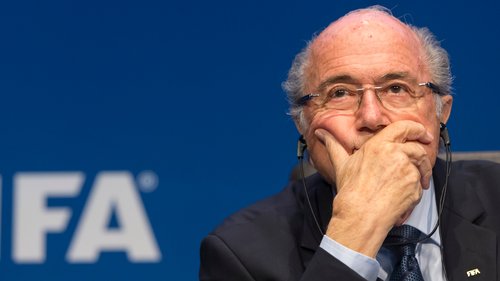By Samindra Kunti
October 8 – Former FIFA president Sepp Blatter has launched another stinging attack on his successor Gianni Infantino, accusing the latter of “selling out the people’s game,” alluding to Infantino’s expansion of the World Cup to 48 teams and his mysterious $25 billion investment plan.
“Infantino doesn’t talk with me,” remarked Blatter again in an interview with German newspaper Süddeutsche Zeitung. Relations between Blatter and Infantino have long been strained. In 2016, Infantino became the new FIFA president as Blatter exited the organisation after 41 years under a cloud of corruption and FIFAGate. Blatter has always maintained his innocence.
The former FIFA strongman questioned the direction Infantino is taking the global game in. In January 2017, FIFA expanded the World Cup to a 48-team tournament. The new format will come into force in 2026 when the United States, Mexico and Canada will serve as hosts. “That is not realistic anymore,” criticised Blatter. “There are too many teams, it takes too long, there are too many unattractive games. And playing in groups of three, you cannot do that. That’s what we did in 1982 in Spain. One has to watch, and the last game can somehow be turned.”
Blatter wasn’t just carping. He reserved his biggest disapproval for Infantino’s $25 billion outside investment proposal. It’s a coup the new FIFA president hasn’t been able to pull off yet as he tried to take the FIFA Council by surprise without disclosing the fine print of the plan or the investors behind a potentially enlarged Club World Cup and a global Nations League. For now, the plan has been shelved.
“You cannot sell the football,” said Blatter. “Football belongs to the two billion people he cares about.”
Blatter expressed his doubts if the plan has been abandoned or not. “What is very interesting for me in the matter: That the media often disagree, I know that. But what I have never seen is that a bandage got up and said: Stop!”
He said: “The FIFA board has never stood up and said: No, that does not work. Well, I’m surprised to hear that.”
In Zurich Blatter has rapidly become a marginalised figure, having been alienated by the new leadership at FIFA HQ as the new regime systematically purged all senior personnel from the Blatter era. In August Marco Villiger, FIFA’s chief lawyer, was pushed out of the door. Villiger had been the key link between the governing body and U.S. anti-corruption investigator and the last senior employee of the Blatter era. Ironically, Blatter in part blames Villiger for his downfall.
“I was betrayed,” reiterated Blatter in the interview. “The then chief lawyer Marco Villiger, who has now been replaced, betrayed me – and the Secretary General. I noticed that later, when he was already suspended.”
Blatter didn’t elaborate about Valcke’s betrayal, saying that “during this month I am a witness for the prosecution.”
With the fallout from FIFAgate still shaking world football to the core and the US Department of Justice’s warning that there is more to come, Blatter acknowledged that the times of football and sports as self-regulating bodies may no longer be sustainable.
In the future, sports should not be immune anymore from government regulation, according to Blatter. In accepting a changing world and almost ceding sports’ famed autonomy, he also took a swipe at IOC president Thomas Bach, questioning the German’s leadership skills.
“It is always said that sport should be independent…but that’s not possible today. It is not enough anymore,” mused Blatter.
“You can no longer run such businesses unprofessionally,” explained Blatter. “That’s top management today. It’s no longer just people who have grown up in sports. FIFA is a club, the IOC is a club – like the fishing club down here. Or like the gymnastics clubs in Embrach. That is not right anymore. We should now give sports different, right structures. You do not learn to lead by being a master in some kind of sport. This also applies to the IOC – who leads this? The fencer…and there the leadership element also fails.”
Contact the writer of this story Samindra Kunti at moc.l1745240884labto1745240884ofdlr1745240884owedi1745240884sni@o1745240884fni1745240884

